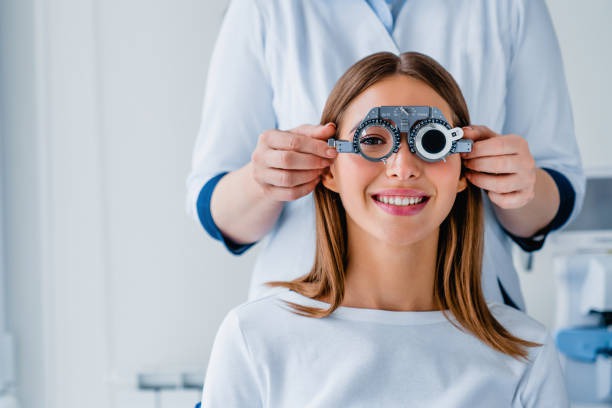Our eyes are not just windows to the world but also crucial portals that can give us a glimpse into our overall health. Many of us take our vision for granted until we start noticing changes. Have you ever wondered why that might be? The truth is our eyes can endure significant damage before any noticeable symptoms appear. Catching these issues early is key, and that’s where regular eye exams come into play.
Why Eye Exams Are Crucial
An eye exam is more than just a check-up to see if you need glasses or contact lenses. It’s a comprehensive inspection that can detect a variety of potential health concerns. From distinguishing subtle signs of glaucoma to unearthing evidence of diabetes, a routine exam is a safeguard against an array of medical issues. Moreover, with age and lifestyle factors playing a significant role in our vision health, it’s essential to commit to regular eye exams. Fortunately, clinics across the country offer accessible options.
By ensuring regular exams with a trusted clinic tailored to your specific needs, like an eye exam in Bloomington, you’ll be one step ahead in protecting your invaluable sense of sight.
What Happens During an Eye Exam
So, what exactly goes on behind those optometry doors? An eye exam typically includes several assessments:
-
Visual Acuity Test: This determines how well you see at various distances.
-
Refraction Assessment: Helps determine any refractive errors such as nearsightedness or farsightedness.
-
Eye Muscle Test: Check for any abnormalities in how your eye muscles work together.
-
Glaucoma Test: Measures the pressure inside your eyes to look for signs of glaucoma.
-
Slit-lamp Exam: This allows the doctor to see the structure at the front of your eyes under magnification.
These assessments are painless and remarkably revealing in understanding your vision health.
Spotting Early Signs of Eye Conditions
One of the best things about regular eye exams is their ability to catch eye conditions early on. Conditions such as cataracts, macular degeneration, and diabetic retinopathy can silently impair vision without you even realizing it. Let’s delve a bit deeper into some of these conditions:
-
Cataracts: A common condition that clouds the lens of the eye, leading to blurry vision.
-
Macular Degeneration: Causes loss of vision in the central visual field. It’s particularly common among older adults.
-
Diabetic Retinopathy: A diabetes complication that affects the eyes, caused by damage to the blood vessels of the light-sensitive tissues at the back of the eye (retina).
The silver lining? Most of these conditions are treatable if detected early, which is why keeping up with eye exams is so important.
Frequency of Eye Exams
Now, you might wonder, how often should I schedule an eye exam? The general recommendation is as follows:
-
Children: At least one eye exam before starting school, and then every two years.
-
Adults: Every two years if you’re younger than 60 and annually if you’re 60 and over.
-
Individuals With Eye Conditions: Follow the schedule set by your eye care professional.
However, these guidelines can vary based on your health, family history, and risk factors.
Finding an Optometrist
It’s essential to find an eye care professional whom you trust and feel comfortable with. Nowadays, searching for an “optometrist near me” can yield numerous results that simplify this process. Prioritize finding clinics or optometrists who have good reviews and are conveniently located for you.
Glasses and Contacts
For many of us, receiving a prescription for glasses or contact lenses is a low-key milestone of adulting. Eye exams can refine these prescriptions to ensure optimal vision. But it doesn’t end with wearing glasses; regular follow-ups ensure your prescriptions are current and that there are no underlying issues missed the first time around.
Protecting Your Vision
Aside from attending regular exams, there are other proactive measures you can take to preserve your vision:
-
Wear Sunglasses: Shield your eyes from harmful UV rays that can lead to cataracts.
-
Maintain a Healthy Diet: Foods rich in Omega-3 fatty acids, lutein, zinc, and vitamins C and E might help fend off age-related vision problems like macular degeneration.
-
Quit Smoking: Smoking increases your risk of developing cataracts and age-related macular degeneration.
-
Exercise Regularly: Maintaining a healthy lifestyle ensures adequate blood flow to the eyes and reduces conditions that may affect vision, such as high blood pressure.
It’s the little changes that collectively make a big difference.
The Cost of Neglect
Ignoring eye health and thus bypassing regular exams can have severe implications. Individuals who do not attend regular eye exams risk allowing eye conditions to progress, sometimes to the point where vision loss becomes inevitable and irreversible. Additionally, vision loss can affect nearly every aspect of life, from working and reading to driving and recognizing familiar faces. With such a broad impact, why take the chance?
Finding a Local Eye Specialist
For those residing in specific communities, seeking a local eye doctor in Bloomington makes the most sense. An eye care specialist familiar with your local environment and community needs can offer personalized advice that considers local lifestyle factors.
Final Thoughts
In conclusion, preserving your eyesight is not just a matter of focusing on vision; it encompasses a broader scope that touches upon overall health. Regular eye exams are one of the most impactful steps you can take toward this goal. Whether it’s checking for systemic diseases or updating your prescription lenses, these examinations are integral to catching eye conditions early, treating them effectively, and ultimately maintaining your quality of life. Your future self will thank you for it.


